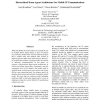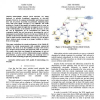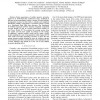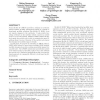ISCC
2006
IEEE
14 years 5 months ago
2006
IEEE
While the Mobile IP protocol does not exclude the use of multiple Home Agents (HAs), it does not impose any particular model either. Recent solutions propose that a mobile node us...
ICWMC
2006
IEEE
14 years 5 months ago
2006
IEEE
: We present a predictive handoff mechanism that can predict the occurrence of L2 handoff well. It can be used as a trigger for Mobile IP to start network layer handoff ahead exact...
GLOBECOM
2006
IEEE
14 years 5 months ago
2006
IEEE
— IP mobility can be handled at different layers of the protocol stack. Mobile IP has been developed to handle mobility of Internet hosts at the network layer. As an alternative ...
GLOBECOM
2006
IEEE
14 years 5 months ago
2006
IEEE
— IETF has developed Mobile IP to support mobility of IP hosts at the network layer. The National Aeronautics and Space Administration has implemented Mobile IP to handle handove...
ICC
2007
IEEE
14 years 5 months ago
2007
IEEE
— Mobile IP is a solution for mobility support in the global Internet. However, it suffers from long handoff delay. Many solutions have been proposed to reduce the handoff delay ...
VTC
2008
IEEE
14 years 6 months ago
2008
IEEE
—Metropolitan wireless mesh networks are being deployed to provide broadband connectivity to city-wide hotspots. However, its commercial feasibility and business model have not y...
PIMRC
2008
IEEE
14 years 6 months ago
2008
IEEE
—Future generations of mobile operator networks, based on an all-IP-based flat architecture and a multitude of different access technologies, require a proper IP-based mobility ...
IWCMC
2009
ACM
14 years 6 months ago
2009
ACM
Proxy Mobile IP (PMIP) provides a solution for networkbased localized mobility management which in contrast to host-based mobility solutions, like Mobile IP (MIP), does not requir...
PERCOM
2005
ACM
14 years 11 months ago
2005
ACM
Mobile IP is a common standard to support global mobility of mobile hosts (MHs). One of the major problems for the Mobile IP is frequent location update and high signaling overhea...




